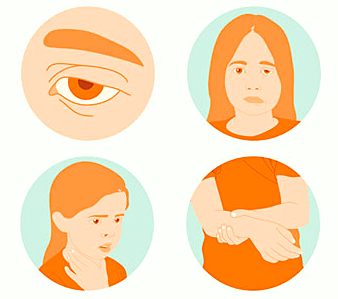Doctors’ Notes
BackAcute Flaccid Myelitis
You’ve probably heard the scary news stories about Acute Flaccid Myelitis (AFM), including three cases here in Pittsburgh. We have too, so we wanted to share some details with you.
What is AFM?
 AFM is a Polio-like illness that has been around for years, but that seems to be happening slightly more frequently in the last few years around the United States, including the current cases in Pittsburgh.
AFM is a Polio-like illness that has been around for years, but that seems to be happening slightly more frequently in the last few years around the United States, including the current cases in Pittsburgh.
AFM can be very serious, causing problems with muscle control, including the muscles used to breathe. Researchers aren’t sure what causes the illness, although it’s likely some sort of virus. There is lots of ongoing work to learn more about what causes, and how to prevent, this illness.
The problem, as we all know, is that kids get viral illnesses with fever all the time, and they’re even more frequent as we head into the winter. So how can you tell the difference between a minor viral illness and something that could be more serious?
Kids with viral illnesses frequently have a fever, especially in the first few days. As you know, and as you can read more about here, fever is simply part of the body’s immune response to germs. It’s not harmful, and we treat it to help the child feel more comfortable, not because fever is bad for you.
If your child has typical viral symptoms — cold symptoms, vomiting or diarrhea, maybe a sore throat — and otherwise seems OK, offer supportive care like you already know how to do. More fluids, rest, and maybe a fever-reducing medicine will help them to feel better, and in a few days, they’ll be over the worst of it and back to their normal selves.
What to Watch For
The most important difference to be aware of is that kids with AFM develop the sudden onset of muscle weakness. In addition to fever and viral symptoms as described above, you might see a droopy eyelid, droopy facial muscles, difficulty swallowing, slurred speech, or weakness in an arm or leg. If you see those signs happening, call us right away. We’ll want to see your child in the office, or possibly refer you directly to the emergency department at Children’s Hospital, depending upon the specifics.
We hope this information is helpful. This is an important illness to be aware of, but not to lose sleep over. It still is a very rare thing, it’s NOT contagious, and the overwhelming majority of children with fevers and viral symptoms will be completely fine.
If you’d like to learn more, see this excellent CDC resource page. And, as always, if you have any questions or concerns, you can call us in the office any time.
Dr. Sarah Springer, a Shareholder in the practice, has been a Kids Plus Doc since 2003.